MercoPress. South Atlantic News Agency
Tag: COVID-19
-
Saturday, January 30th 2021 - 09:05 UTC
Large companies sign “Neptune Declaration” to help crews trapped in ships because of Covid-19
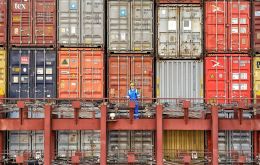
More than 300 large companies pledged this week to work together to help hundreds of thousands of merchant sailors trapped on ships for many months due to Covid-19. About 90% of world trade is transported by sea, and coronavirus restrictions in many countries are affecting global supply chains.
-
Friday, January 29th 2021 - 08:47 UTC
Falklands: MPC access limited to essential travel because of Covid-19 positive case
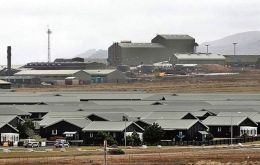
The Falkland Islands Government confirmed on Thursday that a military medic involved in quarantine surveillance swabbing has tested positive for Covid-19 as a result of displaying symptoms.
-
Thursday, January 28th 2021 - 09:59 UTC
Uruguay will partially reopen its borders as of February
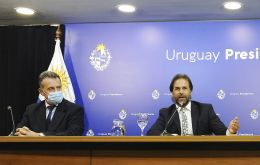
Uruguayan president Luis Lacalle Pou announced on Wednesday the partial lifting of the borders' total closure which had been established last December 20, but all other measures that had been announced on that date remain in full compliance.
-
Thursday, January 28th 2021 - 09:51 UTC
Over a million people have died from Covid-19 in the Americas

More than one million people have died from COVID-19 in North and South America, the Pan American Health Organization (PAHO) reported. Last week two million more cases were reported in the Americas, with the United States the main driver of the outbreak.
-
Thursday, January 28th 2021 - 09:11 UTC
Colombian defense minister and respected politician dies of Covid-19
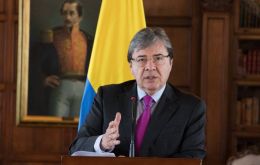
Colombia's defense minister has died in hospital after contracting coronavirus, the government announced. Carlos Holmes Trujillo, 69, was taken to hospital with Covid-19 earlier this month and had developed viral pneumonia.
-
Thursday, January 28th 2021 - 08:55 UTC
China has begun using anal swabs for high risk population

AFP – Anal swabs are being used in China to test those it considers at high risk of contracting Covid-19, state TV reported. According to doctors, the invasive procedure is said to be more effective in detecting the virus.
-
Wednesday, January 27th 2021 - 20:39 UTC
Director of Sinovac's intermediary institute said it did not close a deal with Uruguay for vaccine

The Director of the Butantan Institute on Tuesday contradicted the words of Uruguayan President Luis Lacalle Pou, assuring that there is not yet a closed agreement between the Uruguayan government and the Chinese laboratory Sinovac for the purchase of the vaccine against Covid-19. However, the institute affirmed that there is a pre-agreement and talks are still ongoing. Lacalle Pou announced on Saturday at a press conference the purchase of 1.75 million doses from this laboratory.
-
Wednesday, January 27th 2021 - 09:27 UTC
Global Covid-19 reaches 100 million cases and 2,155.00 deaths, John Hopkins Center
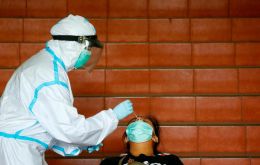
The world has reached 100 million COVID-19 infections, according to Johns Hopkins Coronavirus Resource Center statistics. More than 2,155.00 people have died from the virus.
-
Wednesday, January 27th 2021 - 09:05 UTC
Falklands currently has seven Covid-19 positive cases, but with no need of hospital admission
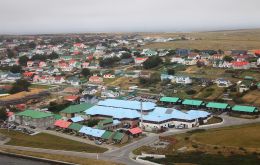
The Falkland Islands Government has offered an update of Covid-19 swabbing results as of Tuesday 26 January, indicating that of 6,685 processed tests, seven are currently positive, completing quarantine, but none of them has required hospital admission.
-
Tuesday, January 26th 2021 - 09:27 UTC
ILO: Pandemic in 2020 has caused massive loss of working hours, equivalent to 255 million full time jobs
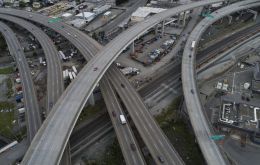
Tentative signs of recovery are emerging in global labor markets, following unprecedented disruption in 2020 due to the Covid-19 pandemic, according to the latest report from the International Labour Organization, ILO.
